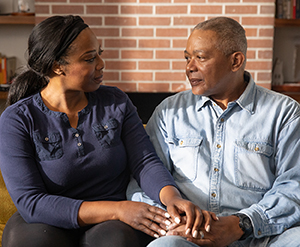Your Emotional Health After Bypass Surgery
Having heart disease and heart surgery may trigger a variety of feelings. You may be relieved to have had treatment. But you may also feel depressed or angry at times. This is common. Up to 1 in 4 people develop "cardiac depression" after heart surgery. You may also feel that your loved ones don’t let you do enough. These feelings are normal. But they can make you short-tempered with those around you. Letting them know how you feel will help avoid misunderstandings.

Take part in a cardiac rehab program
-
Making changes isn’t easy. It helps to have a support system you can rely on. Start with your cardiac rehab center. It’s a place where people understand what you’re going through. You can talk to others about your feelings and experiences. You can ask questions about goals and building a healthier lifestyle. And you can work with your cardiac rehab team to set goals and stay on track.
-
You'll work with a team of specialists. Your team may include doctors, nurses, exercise specialists, dietitians, and counselors. You'll get help dealing with the emotional aspects of your recovery. This may include help with depression and anxiety. It may also include practical advice and support for quitting smoking, losing weight, being physically active, and continuing your sex life.
-
Cardiac rehab can help you get back into your normal routine after surgery. It gives you tools to improve your overall health for the rest of your life. Turn to your family and friends for additional support. Open communication is the best way to find support in those around you.
Talking about your feelings and needs
Your loved ones can support you better if they know how you feel. When you talk with your spouse or other loved ones:
-
Choose a time when you can relax and talk without being disturbed.
-
Use terms such as “I feel…” or “I need you to…” This tells your loved one how you feel without blaming them.
-
Be sure to give your loved one time to say what they feel and need. This is a hard time for those close to you, too.
-
You may want to talk first to a friend or family member who doesn’t live with you. This can help you understand your own feelings.
Notes to family and friends
-
Accept that your loved one may be depressed or angry at times. Try not to blame yourself for these feelings.
-
Recognize that you may feel angry or depressed, too. Try to talk openly about your feelings. You may want to talk with a friend or other family member first.
© 2000-2025 The StayWell Company, LLC. All rights reserved. This information is not intended as a substitute for professional medical care. Always follow your healthcare professional's instructions.